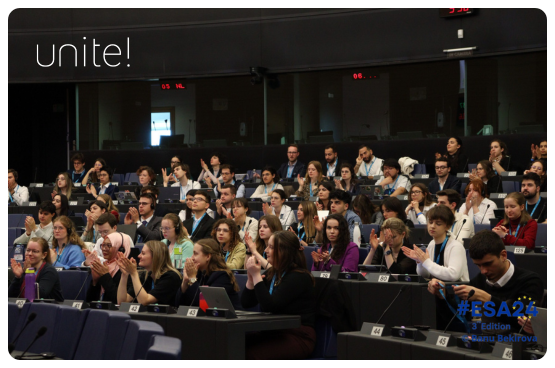
Unite! students raise their voice for the future of Europe at the European Student Assembly 2024
Unite! was represented by 10 students who participated in the Assembly's panels, contributing to the formulation of 79 recommendations. These recommendations reflect the students' state of mind and expectations for their future on the continent.
The 3rd edition of the European Student Assembly (ESA), held from 10-12 April 2024 in the European Parliament in Strasbourg, brought together 250 students, from 41 European University Alliances, to discuss pressing issues and formulate recommendations for the future of Europe. This ESA edition received more than 2200 applications from students across Europe. The selection process was based on motivation and academic excellence, ensuring the best representation of genders, ages, countries, levels and fields of study. As a result, the ESA managed to unite students from Bachelor to PhD, with a common interest in debating on the future of Europe. The ten Unite! Students that participated in this edition were distributed among 10 out of the 11 panels of the Assembly.
The students debated topics such as enhancing voter turnout in European elections, addressing climate change, promoting cultural heritage, and integrating biomedical advancements into healthcare. They also discussed strategies for maximizing the benefits of AI, combating euroscepticism, and ensuring inclusivity in higher education.
Below you will find a summary of the recommendations from students during the ESA 2024 (the complete text can be found in the ESA policy recommendations report):
- Enhancing voter turnout in European elections: Students emphasized the need to increase youth involvement, combat misinformation, and implement structural reforms to make the electoral process more accessible and inclusive for young people, such as lowering the voting age and providing for online or postal voting, to boost voter turnout in European elections.
- Addressing Climate Change: Recommendations included supporting organic agriculture, promoting green travel, addressing greenwashing, and enhancing EU-Global South partnerships to achieve responsible growth in the face of climate change.
- EU Budget and Cohesion: Students advocated for the use of tools like the Multiannual Financial Framework and the European Semester to align national and EU policies, promoting economic and environmental collaboration.
- Migrant Treatment: Recommendations focused on upholding human rights, promoting integration, safeguarding borders, and improving cooperation among member states to address the treatment of migrants amid rising anti-immigration sentiments.
- AI and Globalization: Students called for equitable relationships with third countries, investment in civil society, and addressing global conflicts like the situation in Gaza to uphold EU values and ensure sustainable investments.
- AI and Healthcare: Recommendations included closing regulatory gaps, supporting ethical AI development, and ensuring societal benefits to maximize the benefits of AI while addressing its challenges.
- Cultural Heritage: Students advocated for collaboration, education, inclusion, and accessibility to promote and preserve European cultural heritage, emphasizing sustainable tourism practices and climate change considerations.
- Biomedical Advancements: Recommendations stressed the need to overcome regulatory barriers, ensure data security, and provide equitable access to innovations integrating biomedical advancements into healthcare.
- Inclusivity in Higher Education: Proposals included policies for accessibility, diversity, mental health support, and equal opportunities to ensure inclusivity in higher education.
- EU Enlargement: Students advocated for public support through targeted campaigns, economic cooperation, gradual accession processes, and media freedom to promote EU enlargement.
- Combating Euroscepticism: Proposals included enhancing EU education, strategic communication campaigns, and increasing national parliaments' involvement in EU governance to build trust and cooperation.
Recommendations were voted upon individually, employing a simple majority of the expressed votes to determine the outcome. The assembly ended with the voting and adoption of 79 recommendations presented in the ESA policy recommendations report. These recommendations reflect the students' state of mind and expectations for their future on our continent. By proposing these concrete actions, students aim to have a concrete impact on their future and hope that the compilation of these recommendations can lead to political responses at local, national, and European levels. The ESA's focus on these hot topics highlights the importance of discussing European issues and the role students can play in shaping the future of the continent.
